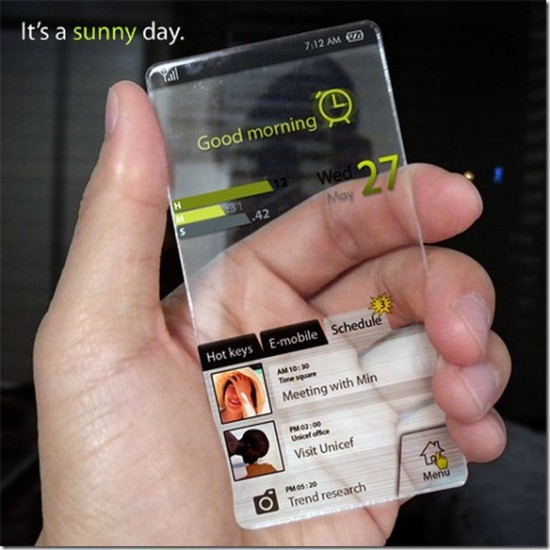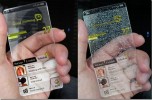check the rose below – all you have to do is concentrate on the little cross on the left, and then after a minute or so, switch your focus to the cross on the right. The black and white photo now becomes pink.
Science news, art news, Funny weird news, photos, pictures, videos about just everything to keep you entertained... you will always learn something new :)
Friday, August 20, 2010
Windows Unveils Phone of Future
The new Windows Future Phone takes the look and feel of upcoming future mobile devices . To be released , the latest Windows Phone’s intuitive user interface makes it one of the most amazing devices I have seen all these years . It is something like some ultra-terrestrial gadget from the space. This Windows Phone will change the entire ecosystem. This new device of the future concept cell phone has surfaced recently , and it’s truly impressive. Features the latest Windows Mobile user interface, 3D video calling & much more.
Touchscreens may have completely changed the cell phone interface today, but tomorrow’s mobile devices will go even further, even responding to grip & other forms of user action. It’s not everyday that you see a phone that can “bend and twist” at your command , but future phones will. Mobile phone technology is advancing so rapidly, that people can expect to be using what is thought to be impossible by 2015 .

Thursday, August 19, 2010
☸ 10 Biggest Misconceptions We Learn in School ☸
1) Einstein got bad grades in school.
Generations of children have been heartened by the thought that this Nobel Prize winner did badly at school, but they’re sadly mistaken. In fact, he did very well at school, especially in science and maths (unsurprisingly).

2) Mice like cheese
Mice enjoy food rich in sugar as well as peanut butter and breakfast cereals. So a Snickers bar would go down much better than a lump of cheddar.

3) Napoleon was short.
He was actually around 5ft 7, completely average for the 18th/19th century.

4) Thomas Edison invented the light bulb.
Edison invented a lot of things – in fact he’s one of the most famous inventors of all time – but the light bulb wasn’t one of them. What he did was develop a light bulb at the same time as the British man, Joseph Swan, who came up with it originally.

5) Lemmings throw themselves over cliffs to commit suicide
The poor old things are sometimes so desperate for food that they do, according to the BBC “jump over high ground into water”, but they aren’t committing group suicide.

6) Water flushes differently in different hemispheres
No it doesn’t. Sorry!

7) Humans evolved from apes
Darwin didn’t actually say this, but he’s been misreported ever since. What he did say was that we, and apes, and chimpanzees for that matter, had a common ancestor, once, a long, long time ago.

Vikings may have been buried with their helmets and with drinking horns. When they were dug up by the Victorians, they assumed that the helmets had horns.

9) Columbus believed the earth was flat
He may not have known how big the world was, but he wasn’t worrying about falling off the edge of it.

10) Different parts of the tongue detect different tastes
You do have different taste buds on your tongue and some are more sensitive than others. But they aren’t divided into perfect, easy-to-teach sections.

☼ 10 Weird Laws Around the World ☼
The more laws and order are made prominent, the more thieves and robbers there will be. Here is a collection of some of the eccentric laws in the world. We can laugh, we can gasp, we can only wonder…
1. Think before you chew
In Singapore, chewing gum is prohibited. This rule was introduced because of the high cost and difficulty in removing stuck chewing gum from public premises. In particular, chewing gum stuck on the Mass Rapid Transit train doors stopped the trains from moving. It happened a few times and those were a few times too many.
2. Lighten up
Drivers in Denmark are supposed to drive vehicles with their headlights on. You’d think this law would apply to night driving but it doesn’t. It is considered essential during the day as well or they may face a fine of up to $100. Studies have shown that this has helped a lot to avoid road accidents in Denmark.
3. To fail > to jail
In Bangladesh, children 15 and older can be put in jail for cheating on their final examinations. Every year, Bangladeshi government takes strong measures to stop cheating and carries out a massive media campaign to forewarn students through print and television.
4. Picky about chicks
According to Akron- Ohio Act 925.62, No person, firm, or corporation shall dye or otherwise colorany rabbit or baby poultry, including, but not limited to, chicks and ducklings. No person, firm, or corporation shall sell, offer for sale, expose for sale, raffle, or give away any rabbit or baby poultry which has been dyed or otherwise colored.
5. Keep the change
In Canada, Currency Act of 1985 prohibits consumers from using unreasonable amounts of coins to pay for purchases. This means you can’t pay for an item in all coins (especially if it’s over $10). Even the use of dollar-coins is limited. The shop owner has the right to choose whether or not he wants to take your coins but doesn’t have to.
6. Sue them pants!
In France it is still against the law for women to wear pants. The law reportedly has been on the books since 1800.It was amended several times: once in 1892 to allow women to sport trousers while riding horses and again in 1909 to permit the ladies to wear pants while on bicycles.
7. Being twins, a sin?
China’s one child policy was established by Chinese leader Deng Xiaoping in 1979 to limit communist China’s population growth. 35.9% of China’s population is currently subject to the one-child restriction. The government believes it has helped to alleviate social, economic and environmental problems in China.
8. The law with a flaw
In Georgia no bicycle shall be equipped, modified, or altered in such a way as to cause the pedal in its lowermost position to be more than 12 inches above the ground, nor shall any bicycle be operated if so equipped. The question is: Who would ride such a bike?
9. One Two Three GO!
In Massachusetts at a wake, mourners may eat no more than three sandwiches. It is one of those laws that was written in books and never removed since then. Bad manners, one might consider it, but in Massachusetts it is a criminal offense.
10.ImPie-ous Christmas
In Britain, it is illegal to consume a mince pie on Christmas Day. It is one of the odd old laws on the statute book, although rarely enforced by even the keenest police officer. It was brought to existence by Oliver Cromwell, self proclaimed Lord Protector of England. Festivals that promoted gluttony and drunkenness were against the righteous Christian ethics, including Christmas.
5 Most Useful But Simple Inventions
There are many inventions which contributes a great share in our works, never realize there importance and keep utilizing them. We bring you some of the inventions which became an integral part of our lives and didn’t even claimed the title of an invention.
1. Rubber Bands
Rubber bands were invented by Stephen Perry in 1845 under the banner of Messers Perry & Co, England. He invented rubber band through vulcanized rubber. Ever since that day it has become an integral part of our offices. Whenever we want to bind something the first solution we think of is rubber band.
2. Paper Clip
Other important things without which our office stationary cannot be completed are paper clips. This amazing invention is a brain child of John Vaaler a Norwegian patent clerk in 1890. He created one through having a paper clip of “two tongues” and thin spring-steel wire with two square ends. Vaaler originated his invention first in Germany and then later in USA in 1901. Although the current shape of paper clip was designed by William Middlebrook of Waterbury, USA in 1899.
3. Straws
This amazing piece of discovery came from Marvin Stone in 1888 AD. At first he winded a piece of paper around a pencil and glued it. Then he replaced the paper with paraffin-coated Manila paper so that straws do not become soggy. After several failed attempts he came to the conclusion that its length should be 8 inches and diameter just enough to avoid any seeds. Thanks to Marvin, we can now drink more conveniently.
4. Ropes
Ropes were first used by Ancient Egyptians somewhere around 3500BC. Ropes at that time was made from silk fibers, animal fur etc. Idea of making a rope came from vines. Twisting these vines made their way to the discovery of ropes. Today ropes are widely used in mountain climbing, construction and of course tighten stuff.
5. Shopping Bags
Shopping bags were invented by Mr.Walter H.Deubner, owner of a small grocery store in St. Paul, Minnesota. One day sitting behind the cash counter he noticed that people used to buy limited stuff so that they can carry them conveniently. He then invented prefabricated package, inexpensive that was strong enough to carry 75 pounds of grocery. Within three years he patented his product and it gained a quick popularity and he earned millions in a year.
Subscribe to:
Posts (Atom)





































